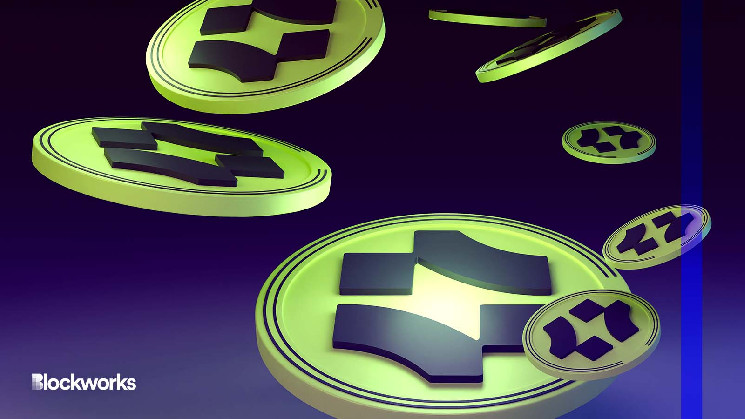DeFi derivatives protocol Cega Finance has expanded its Solana and Ethereum-based structured investments product to the Layer 2 network Arbitrum.
Alongside the launch, Cega is introducing its “L2” vault, allowing users to stake the USDC stablecoin, with Arbitrum’s ARB and Optimism’s OP tokens used as a basket of underlying assets in the options strategy.
Cega claims the vault can generate an estimated APY of up to 63% and downside protection of 50%, with backtesting results indicating a 5% probability of risk losses on the invested principal, according to a statement.
“The L2 vault strategy offers a diversified and risk-managed approach to earning high yields in DeFi,” Cega said.
Structured investments — a category within a financial derivatives market worth trillions of dollars in traditional finance — are more customized than regular options that allow users to buy or sell an underlying asset at a specific price and time.
Cega’s structured investments are less complex than in traditional finance, featuring “crypto asset underlyings (e.g. ETH, BTC, ARB)” compared to “classic market indices (S&P) or equities (TSLA, GOOG)” that introduce additional intermediaries and cost, Cega co-founder and CEO Arisa Toyosaki told The Block in an email.
Structured investments
“These structured investments offer advanced trading strategies to investors and provide a range of benefits including: higher yields, downside protection against market downturns, flexibility to express particular trading views of the market and customized positions to meet specific investor risk/return needs,” Toyosaki added.
Asked why Cega chose Arbitrum for its latest expansion, Toyasaki told The Block that the company’s “mission is to create superior investing strategies for every investor in DeFi, and launching on Arbitrum was the natural next step in achieving greater accessibility. We are excited to bring our innovative stablecoin vault strategies to a community that prioritizes DeFi innovation and has a strong user base already familiar with derivatives (e.g. GMX).”
“Additionally the low fees on Arbitrum combined with the familiarity/battle-tested nature of Ethereum makes Arbitrum a good option for DeFi users who want to try Cega and care about those qualities,” Toyosaki added.
Arbitrum benefits
Discussing the benefit to Arbitrum, Toyosaki said the company believes “that Cega products will create strong benefits for users on Arbitrum to gain access to a new kind of return with a strong reward. For L2 blockchains to grow, there need to be real benefits that users can gain by participating in that blockchain. We believe Cega improves this value proposition for Arbitrum with real, higher and safer yields, and thus spurs the continued growth of L2 blockchains.”
The Arbitrum Foundation, which supports the growth of the Arbiturm ecosystem, welcomed the expansion of Cega’s structured DeFi investments to the Layer 2 network.
“As a provider of structured investment products, Cega brings new opportunities to our growing ecosystem, Arbitrum Foundation head of growth Anuja Khatri said in the statement. “We’re excited to see Cega provide users with new opportunities and further expand the possibilities of decentralized finance.”
How it works
Users select a vault strategy from Cega’s app and deposit USDC into a smart contract to trade that specific structured investment, audited by security firms like Ottersec and Zellic. The vaults trade exotic options, offering higher yields than regular options by combining multiple layers of yield, Toyosaki said.
“For example, in the case of the fixed coupon note structure, the structure contains a ‘basket option’ which involves multiple underlying crypto assets to create a higher yield. Cega vaults are USDC deposit, USDC yield, and the yield received by users is the premium that options buyers pay to have those options for the duration of the 27 day staking period,” Toyosaki added.
Cega’s downside protection is offered as a “barrier option,” Toyosaki said. It “provides protection against adverse price movements by customizing the options payoff such that only if the price barrier is breached, it activates the option and affects the final principal received by the user.”
However, the products are not without risk for users.
“We want to be mindful and call out explicitly that this downside protection makes Cega investments safer compared to vanilla options trading but it is not safe. There is market risk involved with investing in Cega vaults and users can lose some of their invested principal if crypto markets prices fall significantly beyond the barrier level,” Toyosaki added.
Toyosaki said Cega has performed 6-month and 2-year backtesting on the vaults unless constrained by limited price data like ARB, which only launched in March.
Toyosaki told The Block Cega’s more conservative strategies were the most popular, including “Cruise Control” and “Autopilot,” which offer 7.9% APY and 8.5% APY, respectively, with “downside protection of up to 90% and 70% against price drops on ETH and BTC.”
From Solana to Ethereum to Arbitrum
Cega was initially launched in June 2022 on Solana and claims to be the first to launch on-chain structured investments and exotic options strategies. In March this year, Cega raised $5 million from a seed extension round led by Dragonfly Capital, primarily to expand the protocol to Ethereum, Toyasaki told The Block in an interview at the time.
Cega co-founder Winston Zhang said it couldn’t disclose the valuation from this latest fundraising but confirmed it was higher than its seed round valuation of $60 million when it raised $4.3 million in March 2022. “We don’t plan to conduct another equity fundraise at the moment,” Zhang added in an email to The Block.
Cega said it has processed over $280 million in trading volume to date, with a peak total value locked of around $50 million. Its current TVL stands at $7.7 million, according to its website. “During the FTX crisis and bear market environment there was a significant drawdown in TVL from our peak, Toyasaki told The Block.
“We learned through extensive customer conversations that users are now more conservative and seek different reward/risk profiles given the new market environment (e.g. U.S. interest rates). We have already been tweaking and prioritizing our financial product roadmap accordingly,” Toyosaki added.
Solana roots
Cega doesn’t intend to move away from its Solana roots, either.
“We are excited about a multi-chain world and aspire to have Cega product parity on all chains for our product catalog. We currently offer 29 different structured investment strategies across our Pure Options vaults, Bond and Options vaults and Leveraged Options vaults. We will prioritize product parity engineering work based on the demand and growth of products,” Toyosaki said.
In terms of further expansion beyond the Solana and Ethereum ecosystems, Zhang said that they “want to continue increasing access to Cega’s strong investment products across chains.”
“We have had inbound interest from numerous blockchain networks and are prioritizing our engineering resources strategically,” he added.
Regulatory concerns
The crypto space has been coming under increased regulatory scrutiny recently, especially in the U.S., after the Securities and Exchange Commission filed lawsuits against Coinbase and Binance, alleging a violation of securities laws by offering assets like Solana (SOL), among others.
Asked about any regulatory or compliance issues that Cega has encountered with its structured investments, Toyosaki said that the firm works “with the best law firms to develop and make Cega products accessible in DeFi in a compliant way. Cega is a Singaporean company and we review local and global legislation.”
”We’re also advised by top U.S. legal counsel who understand structured products (team was formerly the Assistant General Counsel for Bank of America Merill Lynch’s Derivatives and Structured Products groups),” Toyosaki added.
Toyasaki previously confirmed Cega had plans to offer white-label services and launch a token but didn’t have additional comment on the matter.
Arbitrum growth
Arbitrum is one of the leading Ethereum scaling solutions, initially developed by Offchain Labs. The Arbitrum One Optimistic Rollup offers faster and cheaper transactions while still utilizing the security of Ethereum. Its total value locked is up more than 90% this year to over $4 billion, according to The Block’s data dashboard.
Last week, Arbitrum’s DAO secured 700 million ARB tokens valued at $770 million in a vesting contract, set to gradually distribute the funds to the Arbitrum Foundation over four years after a contentious period in Arbitrum’s governance history.
Sourced from cryptonews.net.









